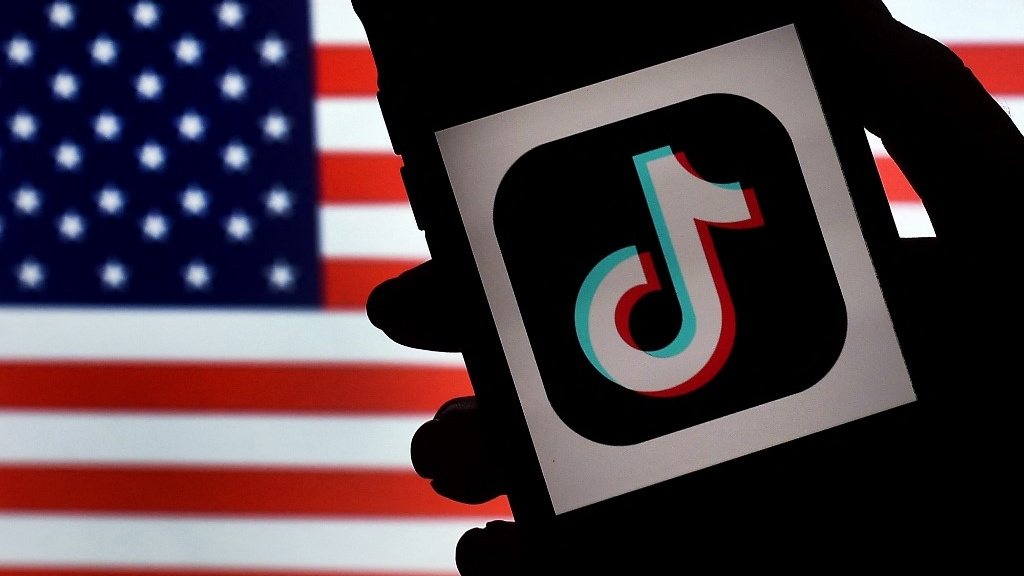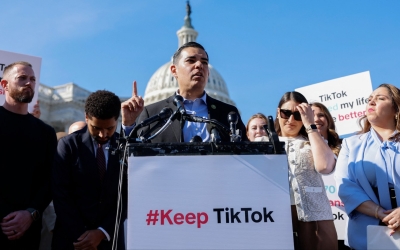TikTok ban: How American civil liberties are under attack

US lawmakers have launched a new set of attacks on American civil liberties by supporting a ban on TikTok, a popular speech platform used by tens of millions of citizens, while also reauthorising a warrantless surveillance law.
US surveillance policy has always been driven by racism, with targeted repression of marginalised communities. American domestic surveillance disproportionately targeted Black activists in the 1960s, and Muslim Americans in the post-9/11 era.
Washington’s latest move is no less racist. On Wednesday, US President Joe Biden signed a law that would ban TikTok if its China-based parent company does not divest the app within a year.
This is not a defence of TikTok. The entire ecosystem of our data is exploitative and vulnerable to abuse, and that is true regardless of the nationality of an app’s ownership.
But it is notable that at a time when a foreign-owned app has empowered marginalised users to challenge the US government’s narrative, American lawmakers are rushing to ban it, citing a need to protect user data from foreign governments.
Stay informed with MEE's newsletters
Sign up to get the latest alerts, insights and analysis, starting with Turkey Unpacked
Both Democratic and Republican lawmakers have expressed concerns about TikTok potentially sharing Americans’ data with the Chinese government. This “national security threat” is explained through vague references to the company’s potential connections with the Chinese Communist Party.
Yet, we have not seen the same outrage from US politicians over reports that data from WhatsApp, owned by the American company Meta, might have been used by the Israeli military in targeting Palestinians. WhatsApp has said the reports are not accurate.
Singled out
According to Meta’s last available Transparency Report, the government of Israel made 1,088 requests of the company between January and June 2023. More than half were categorised as emergency disclosure requests, for which Meta says it may “voluntarily disclose information to law enforcement” if it has “a good faith reason to believe that the matter involves imminent risk of serious physical injury or death”.
Foreign social media platforms such as TikTok have torn down a barrier between American citizens and the atrocities their taxes pay for abroad
Meta produced user data in response to a majority of requests from the Israeli government - 78 percent. Notably, Meta’s Transparency Reports do not disclose the citizenship of users whose information is requested by a foreign government.
The US government’s decision to single out and attempt to ban TikTok, while ignoring the issue of American tech companies sharing data with foreign governments, suggests that American data and surveillance policy is driven in large part by racism.
Amid this backdrop, American lawmakers are also continuing to make it easier for the US government to obtain without a warrant the digital communications of foreigners overseas, including texts and emails.
Last weekend, Congress reauthorised for two years warrantless surveillance via the Foreign Intelligence Surveillance Act. Historically, the targets of such surveillance are disproportionately racialised and marginalised communities.
Global trend
It is also difficult to ignore the timing of the proposed TikTok ban. It follows a foreign-owned social media platform giving victims of US imperial policy a megaphone to broadcast their experiences and suffering, leading to a massive shift in American support for US policy in the Middle East, with young people more likely to sympathise with Palestinians than Israelis.
This trend is global. It’s hard not to conclude that the TikTok ban is being pursued at this moment because of its impact in empowering voices that were previously marginalised, a situation that is detrimental to the official US narrative.
In addition, banning TikTok would remove a tool that has been used to politically educate citizens, mobilise voters and organise protests that challenge those in power.
Democracy requires an informed citizenry that can hold its government accountable. Foreign social media platforms such as TikTok, which might not be as steeped in western bias, have torn down a barrier between American citizens and the atrocities their taxes pay for abroad. Americans are now asking how the “democracy” they enjoy can be reconciled with the wars and genocides their government perpetuates in other countries.
Since the last US wave of surveillance and repression in the post-9/11 era, American citizens have continuously been told we must be willing to give up our civil rights and liberties in exchange for safety and national security. But this is hardly a fair exchange: no amount of bartering away our civil liberties can offer us sufficient protection within a system that inflicts such global violence.
The views expressed in this article belong to the author and do not necessarily reflect the editorial policy of Middle East Eye.
Middle East Eye delivers independent and unrivalled coverage and analysis of the Middle East, North Africa and beyond. To learn more about republishing this content and the associated fees, please fill out this form. More about MEE can be found here.






